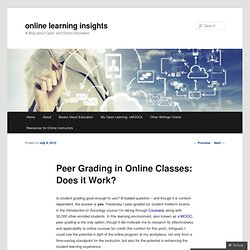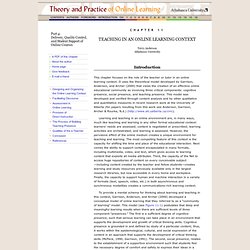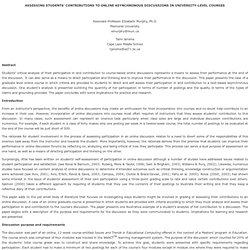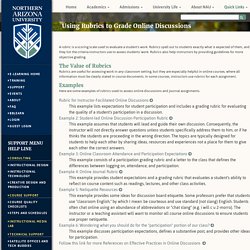

Peer Grading in Online Classes: Does it Work? Is student grading good enough to use?

A loaded question – and though it is context-dependent, the answer is yes. Yesterday I peer-graded six student midterm exams in the Introduction to Sociology course I’m taking through Coursera, along with 30,000 other enrolled students. In this learning environment, also known as a MOOC, peer grading is the only option, though it did motivate me to research its effectiveness and applicability to online courses for credit (the context for this post). Intrigued, I could see the potential in light of the online program at my workplace, not only from a time-saving standpoint for the instructor, but also for the potential in enhancing the student learning experience. Enhanced Learning I see the value of peer grading for what the student gets out of it, more than for the time it saves the instructor.
Several of my classmates reported the same phenomenon via the discussion board – the deeper learning experienced while grading their peers. Like this: ITBL_EvaluatingMarkingOnlineDiscussions_web. DQs as Peer e-Learning Environments. Teaching with Technology Collaboratory - Grading Online Discussions. Teaching Goal: To incorporate an assessment strategy for online discussions that emphasizes their importance and maximizes student participation.

Benefits of Addressing - Research and Theoretical Base Online discussions pose an opportunity for rich and meaningful student learning and interaction. A grading scheme that reflects this lets students know their active and regular participation is not only important to you, but should be important to them as a means of learning course content and making connections between topics. Requiring Online Discussions? Requiring students to post to the discussion board is the first step. But participation alone is not enough when assessing the postings your students make. Require students to post a minimum number of times to demonstrate that they have visited and revisited the material and conversations over several days. Rubrics are a fantastic way to formally assess online discussions. Sample Rubric 1 Original Posting(s) - 7 points Sample Rubric 2. Assessment_Discussions. Chapter 11. Figure 11-1.

Community of inquiry. In a work on teaching presence, Anderson, Rourke, Archer, and Garrison (2001) delineated three critical roles that a teacher performs in the process of creating an effective teaching presence. The first of these roles is the design and organization of the learning experience that takes place both before the establishment of the learning community and during its operation. Second, teaching involves devising and implementing activities to encourage discourse between and among students, between the teacher and the student, and between individual students and groups of students and content resources (Anderson, 2002). Third, the teaching role goes beyond that of moderating the learning experiences when the teacher adds subject matter expertise through a variety of forms of direct instruction. Top Activities in this category of teaching presence include building curriculum materials. Getting the Mix Right Assessment Frameworks 1. 2.
ASSESSING STUDENTS. Associate Professor Elizabeth Murphy, Ph.D.

Memorial University emurphy@mun.ca Tami JeromeCape Lazo Middle Schooltjerome@sd71.bc.ca Abstract Students’ critical analysis of their participation in and contribution to course-based online discussions represents a means to assess their performance at the end of the discussion. It can also serve as a means to direct participation and thinking and to improve their performance in the discussion. Introduction From an instructor’s perspective, the benefits of online discussions may create an enthusiasm for their incorporation into courses and no doubt help contribute to an increase in their use.
Using Rubrics to Grade Online Discussions - ELC Support. A rubric is a scoring scale used to evaluate a student's work.

Rubrics spell out to students exactly what is expected of them, and they list the criteria instructors use to assess students' work. Rubrics also help instructors by providing guidelines for more objective grading. The Value of Rubrics Rubrics are useful for assessing work in any classroom setting, but they are especially helpful in online courses, where all information must be clearly stated in course documents. In some courses, instructors use rubrics for each assignment.
Examples Here are some examples of rubrics used to assess online discussions and journal assignments. Rubric for Instructor-Facilitated Online Discussions.